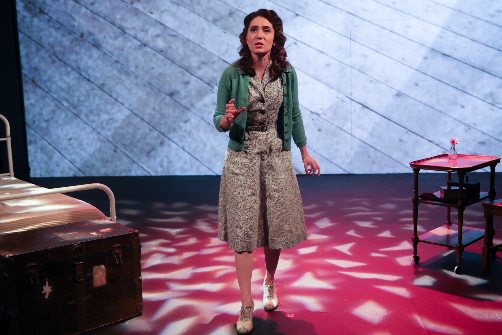A Will To Live
By Helena Weinrauch; Adapted by Kirk Gostkowski; Directed by Rick Hamilton
Off Broadway, Solo Show
Ran Through 9.16.23
The Chain Theatre, 312 West 36th Street, 3rd Floor
by Emily Cordes on 9.17.23
 Masha King in A Will To Live. Photo by David Zayas, Jr.
Masha King in A Will To Live. Photo by David Zayas, Jr.
BOTTOM LINE: Based on a Holocaust survivor’s published memoirs, A Will To Live enacts a harrowing journey of survival and redemption.
Survival narratives, especially true ones, can equally awe and disturb as we marvel at the fortitude that drives their protagonists to overcome staggering hardships or seemingly insurmountable odds. A one-woman adaptation of the memoirs of Holocaust survivor Helena Weinrauch, A Will To Live instills in us this same sense of terror and wonder, following its protagonist’s true account of her life in Nazi-occupied Poland, imprisonment in three concentration camps, and the unexpected journey which led to her liberation and life in America.
True to its source material, Kirk Gostowski’s adaptation begins the show’s story in retrospect: rescued from the Bergen-Belsen death camp and convalescing in a Swiss hospital, a traumatized Helena (Masha King) recounts her tale in an effort to make sense of, and derive meaning from, the horrors she faced. Taking us through Helena’s early life, King paints a searing portrait of a young woman swept up in the most hostile of circumstances, and the grace, luck, and humanity that helped her survive. The daughter of an Austrian businessman and German-Jewish pianist, the 1939 Nazi occupation of Poland threw 16-year-old Helena’s life into chaos as she and her family fought to survive amidst shifting regimes, heightened militarization, and state-sanctioned mass violence.
While her secretary work for her father’s well-connected colleague brought the family funds and respite, Helena found herself scrambling for safety when her parents and sister were abducted in a Nazi raid. With her employer's help, she cycled through various safe houses under an assumed identity, but was ultimately captured by SS officers, tortured, and detained in the Plaszow labor camp. Subject to years of grueling physical labor, stark deprivation, and ceaseless violence, Helena learned to live by her wits, with her clerical skills, musical talents, and personal alliances saving her from death on multiple occasions. As advancing Allied forces prompted the camp’s evacuation, Helena and the other inhabitants were relocated to Auschwitz, then forced on a death march to Bergen-Belsen, where, in 1945, she was found by British liberators amongst the camp’s few survivors. Left without family or prospects, after her recovery Helena moved to New York, where she lives to this day and continues to volunteer, teach, and share her story.
Jumping through multiple years and locations, King and Gostowski capture in arresting detail the fear, confusion, and struggle of Helena’s experience, as well as her story’s hopeful conclusion. Threaded with voiceovers and mechanized sound effects, the narrative’s fast clip highlights the instability and danger that forced Helena and her compatriots to survive from moment to moment. Michael Abram’s lighting similarly evokes police searchlights, dark cells, and jarring daylight, while David Henderson’s projections and spare scenic design give rise to the tale’s many settings.
While the show highlights the worst of humanity, and the checkered actions we may take to self-preserve, it also shows the grace and nuance inherent in dark times, such as fellow prisoners’ acts of support, the folk songs that moved her captors to mercy, or the Jewish guard who, fueled by her kindness toward his sister, protected Helena through his questionable alliances and back-door favors. Perhaps most redemptive are the show’s final moments, in which the real-life Helena shares, through video and voice-over, gratitude for her existence and refusal to harbor hatred despite (or due to) what she witnessed.
A Will To Live makes no effort to silver-line what Helena endured, theorize about the human or higher forces behind her survival, or lean into parallels between historical atrocities and current events. This is, arguably, the point: the show’s impact notwithstanding, Helena’s story, and existence, are whole unto themselves, the choice to depict and share them a testament to both Helena herself and the strength of the human spirit. As history blurs remembrance and personal narratives dissolve in statistics, there can be no greater honor to survivors than to bear witness and keep their tales alive.
(A Will To Live played at The Chain Theatre, 312 West 36th Street, 3rd Floor, from August 24 through September 16, 2023. The running time was 2 hours 30 minutes with one intermission. Performances were Thursdays and Fridays at 7, Saturdays at 2 and 7, and Sundays at 2. Tickets were $35. For more information, visit chaintheatre.org.)
A Will To Live is by Helena Weinrach and adapted by Kirk Gostkowski. Directed by Rick Hamilton. Set and Projection Design by David Henderson. Lighting Design by Michael Abrams. Costume Design by Debbi Hobson. Sound Design by Greg Russ. Stage Manager is Shelby Pickelny.
The cast is Masha King, with voice actors Stephan Goldbach, Anne Kraft, Martin Harris, Josef Urban, Anna Kretzel, Tim Andrews, Ida Barklund, Anni Baumann, and Deven Anderson.

